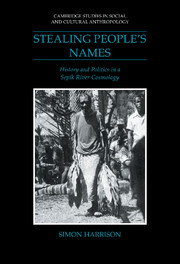Book contents
- Frontmatter
- Contents
- List of illustrations
- List of tables
- Acknowledgements
- Introduction
- 1 The Manambu
- 2 Avatip
- 3 Magic and the totemic cosmology
- 4 Ceremonial rank
- 5 Male initiation
- 6 Treading elder brothers underfoot
- 7 The debating system
- 8 The rise of the subclan Maliyaw
- 9 Symbolic economies in Melanesia
- Bibliography
- Index
- Cambridge Studies in Social and Cultural Anthropology
2 - Avatip
Published online by Cambridge University Press: 08 September 2009
- Frontmatter
- Contents
- List of illustrations
- List of tables
- Acknowledgements
- Introduction
- 1 The Manambu
- 2 Avatip
- 3 Magic and the totemic cosmology
- 4 Ceremonial rank
- 5 Male initiation
- 6 Treading elder brothers underfoot
- 7 The debating system
- 8 The rise of the subclan Maliyaw
- 9 Symbolic economies in Melanesia
- Bibliography
- Index
- Cambridge Studies in Social and Cultural Anthropology
Summary
The community of Avatip
The comparatively large population of Avatip is a result of its location, which is unusually favoured for a middle Sepik riverain community, opposite the confluence of a sizeable tributary – the Amoku River – with the Sepik (see Map 1). The land along the Amoku is the only well-drained alluvial plain in the Manambu area. Haantjens et al. (1972) have rated its agricultural capacity as high, while giving a rating of nil to almost all other Manambu territory. Avatip acquired this valuable land in the nineteenth century, by making war against its original occupants, the Kaunga. The villagers of Avatip have ever since then made yam gardens in the secondary forest on the Amoku, in addition to gardens on the Sepik levees, and in this way produce two crops a year on a staggered schedule of cultivation. In the Amoku ‘bush’ gardens, the villagers grow mainly the yam species Dioscorea esculenta, while they devote the levee gardens to the cultivation of the species D. alata. The villagers attach great ritual importance to the cultivation of alata, as do many other peoples of the middle Sepik, and they celebrate the harvest of the levee gardens in an important annual ritual (see Harrison 1982).
The Amoku also provides Avatip with extensive hunting grounds and areas of sago palm, as well as forest for building materials. As a result, Avatip has a more diversified economy than most of the other settlements along the Sepik.
- Type
- Chapter
- Information
- Stealing People's NamesHistory and Politics in a Sepik River Cosmology, pp. 25 - 41Publisher: Cambridge University PressPrint publication year: 1990



